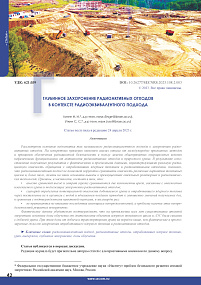Deep disposal of radioactive waste in the context of the radioequivalent approach.
Linge I. I., Utkin S. S.
The paper considers the main drawbacks of the radioequivalent (radiotoxicity) approach to the disposal of radioactive waste based on the analysis of the case studies of applications of this approach. The results of the comparison with actual and forecast data show that the rejection of internationally recognized radiation safety principles in favor of non-physical functionals of radioactive waste and natural uranium activities radioequivalent approach gives neither correct comparison of hazard of various fuel cycle options nor valid conclusions on the advantages of various reactor and radiochemical technologies.
In particular, the reasons are as follows:
- instead of comparison of benefits and costs (hazard), the comparison of the two components of the hazard is carried out related to uranium mining and radioactive waste disposal;
- the scenario of evaluation of the potential hazards of the mined uranium and spent nuclear fuel via water intake and inhalation causes billion-fold overestimated exposure values compared to the practical evidence;
- implications of existing uncertainties are not considered with the uncertainty management problem itself being addressed incorrectly.
Actual data definitely confirm that throughout the nuclear power era, the major doses of radiation exposure from nuclear fuel cycle facilities and NPPs have been mainly associated with uranium mining. Exposure from uranium mining and transportation is several orders greater than the actual and forecasted doses from spent nuclear fuel and radioactive waste disposal.
Keywords: radioequivalent (radiotoxicity) approach, radioactive waste, spent nuclear fuel, uranium, decay storage, deep disposal, exposure dose.
Article language: Russian. Pp. 43–56. [in Russian]. DOI: 10.26277/SECNRS.2023.108.2.003.
Deep disposal of radioactive waste in the context of the radioequivalent approach
Authors:
Linge I. I. , Utkin S. S.
Issue:
2 (108) – 2023.


